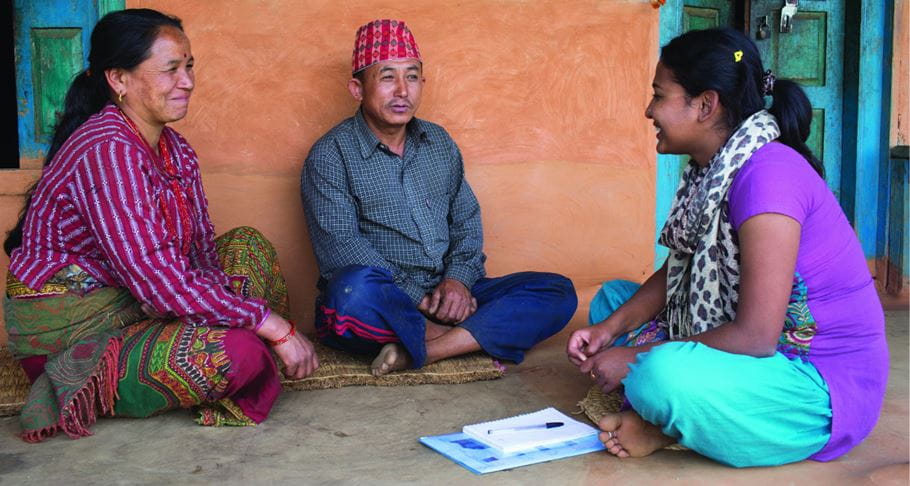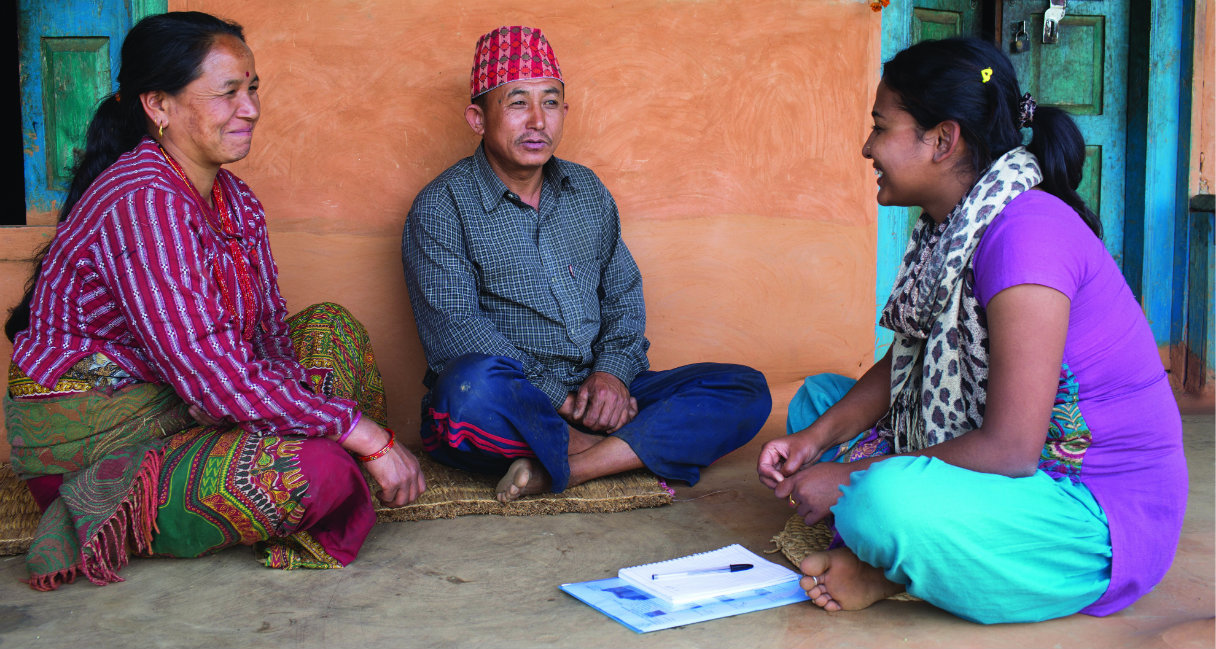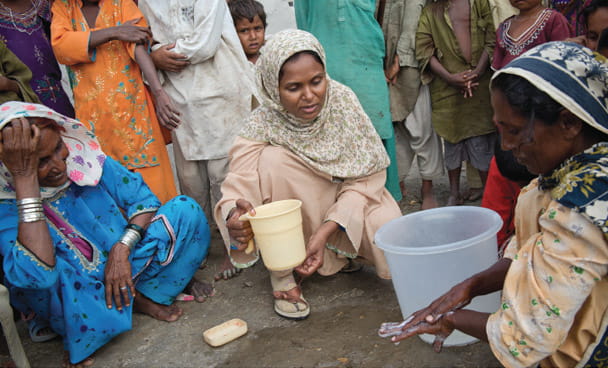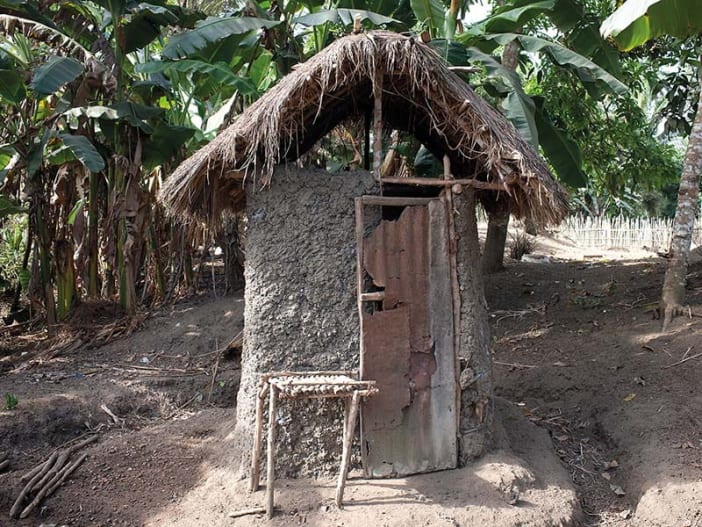We asked community facilitator Pratikchya Khadka of Share and Care Nepal about her sanitation and hygiene work. We hope you will be inspired by her experience of respectfully helping people to change their behaviour.

Interviews
Helping a community to improve hygiene and sanitation
We asked community facilitator Pratikchya Khadka of Share and Care Nepal about her sanitation and hygiene work. We hope you will be inspired by her experience of respectfully helping people to change their behaviour.
2015 Available in Portuguese, Spanish, French and English

From: Hygiene and sanitation – Footsteps 97
How behaviour change happens, the importance of handwashing and how to make soap


It is important for a community facilitator to get to know people. Pratikchya Khadka (far right) speaks to community members about sanitation and hygiene, and changes in the village. Photo: Ralph Hodgson/ Toilet Twinning
What are the main messages or lessons you share in your training?
I share many things! I focus on the importance of the construction and proper use of toilets, hand washing, avoiding drinking from open water sources, taking showers, cutting nails and hair, the use of safe and clean sanitary pads during monthly bleeding, and maintaining cleanliness inside and outside the house. My priority is encouraging people to develop the habit of personal hygiene and to visit the nearby health post rather than relying on untrained traditional healers.
According to the type of participants, the place and environment, I choose appropriate activities such as songs, dance, games and assignments. We also do practical demonstrations of cleaning and hand washing.
When you do training sessions, how do you help people to feel comfortable talking about sanitation and hygiene?
I stay with people in the community. I spend time with them, talking and listening to them. I often do home visits. These bonds help people to open up when I facilitate training sessions. I am always aware of how important people’s feelings are. In particular, during training sessions, I do not use too many facts and data. I try to make them see for themselves what their health and hygiene is like, in a simple way, using local language. I also try to find out whether people agree with what I am saying or not. If I see someone is finding the discussion difficult, I try to talk to him or her individually.
How do you win people’s trust?
I present different true stories (case studies) of other communities and other people. In some cases, being a woman, I do share my own personal experience, especially for the sake of adolescent girls and women. I try to be one of them. When educating, I always carry related resource material so that they can see that what I share is supported with evidence.
How do you identify the people who will build toilets first and work with them to encourage the whole community?
It does not take us a long time to recognise who will build toilets. It is clear from their eagerness, curiosity and the way they have taken the idea of better sanitation to heart. We encourage the group members to support each other in building toilets. We too participate in construction, doing whatever we can do, either digging or carrying things. We make sure we remember their efforts as a true story or case study that we can share in other groups.
Most of the time, people change their behaviour when they learn with evidence and when they witness the impact. At the initial stage, they should be convinced about the benefits. Influencing elders and respected people is very effective because others will follow their words and their example. However, making people believe that they should and they can take the initiative to change their behaviour should be our first priority.
Why do people not use soap to wash their hands?
In my observation and experience, most people know that they should use soap. However, it is not a priority for them and they feel relaxed about it. For example, before eating, few are in the habit of washing. Most people think the extra effort of standing up, going up to the tap, touching cold water and so on is a burden or unnecessary. They think that nothing happens if they do not use soap once, so they prefer to wash their hands only with water. Their attitude is that it is worth worrying about ‘big diseases’ like cancer and Hepatitis, but other diseases are not a big deal. They do not have a culture of hand washing. Furthermore, parents seem least bothered about hand washing and education institutions do not have that facility, so children are growing up without the habit.
How do you encourage people to continue washing their hands with soap, even a long time after the training?
I visit the community frequently with team members. We follow up and teach more if necessary. We ask individuals whether they have been washing hands with soap or not and find out what change they are feeling. Sometimes, we give soaps as gifts or prizes and ask for continuous use.
What tips or recommendations do you have for others doing similar work to you?
It is never easy to work in a traditionally-rooted community and try to convince them of a way they have never tried before. However, someone has to start for transformation and make the earth a better place to live. I would like to share the following from my experience for people who are doing similar work:
- Respect the work you are in and recognise its significance to improve people’s lives, even if it is just about telling them to cut their nails and wash their hands.
- Understand the community and its dynamics – the types of people, the situation, what interests people – so you can develop effective ways to reach people.
- Focus on a cycle for bringing change in people: give knowledge, make them aware, change attitudes, transfer skills and build capacity.
- Be a role model in your personal hygiene and sanitation.
- Do not expect your advice will be followed at once or that things will change quickly. Failures are pillars of success, so do follow up regularly.
- Remain up to date concerning diseases, new sanitary methods and best practices.
- Importantly, remain passionate, inquisitive, non-judgmental and enthusiastic.
With grateful thanks to Surendra Gurung and Ramesh Khadka of Share and Care Nepal for interviewing Pratikchya and writing up her responses on the Editor’s behalf.
Share and Care Nepal works to improve sanitation and hygiene through non-formal education, street drama, strengthening the capacity of existing groups like Female Community Health Volunteers and Child Groups, and creating speech, song and poetry competitions with topics on sanitation and hygiene.
Website: www.share-care.org

It is important to wash all surfaces of the hands with soap. Rita, a community facilitator (centre), watches over a demonstration of hand washing with soap in a village in UC Jaar, Pakistan. Photo: Richard Hanson/Tearfund
What do you do when people do not like something you say in your training?
I give time to them, try to know their views personally and try to persuade them. For example, I was facilitating a women’s action group to help them create their Village Development Committee open defecation free zone. I was telling them about the proper use of a toilet and its construction.
Pratikchya: How many of us have a toilet in our place?
(Members discuss with each other. A few do not have toilets.)
Pratikchya: Why have you not built a toilet yet? The government has a campaign of declaring open defecation free zones. Do you know about it?
Woman: We know. How can we build with no resource? Everyone comes and shares knowledge but they do not provide materials.
Pratikchya: You are right but you might be talking about a more advanced toilet. It is good to have one of those. However, with the use of local materials, we can still build toilets. In your neighbouring Village Development Committee, community members have built pit latrines. That got them into the habit of using a toilet and it compelled them to start saving, so now most of them have more advanced toilets.
We can dig holes and use bushes, plastic, wood or other local materials to build toilets. They will last for some months. If we allow the waste to decompose, it can also be used to make soil fertile and increase productivity.
(The meeting ends with a decision to build pit latrines and support for declaring an open defecation free zone. As a result of the meeting, two members build toilets with local materials.)
If I do not have immediate success persuading people, I approach other family members and influential people in that community who can convince them more easily. I get the support of others, either colleagues or community people, to facilitate if misunderstanding continues.
Ideas for using this article
- Discuss what Pratikchya says about why people do not use soap. Do you agree that these reasons are common? What can be done?
- What facilitation skills did Pratikchya use? How could you use them in your own training?
View or download this resource
Get this resource
Get this resource
Similarly Tagged Content
Share this resource
If you found this resource useful, please share it with others so they can benefit too.

Subscribe to Footsteps magazine
A free digital and print magazine for community development workers. Covering a diverse range of topics, it is published three times a year.
Sign up now - Subscribe to Footsteps magazine





